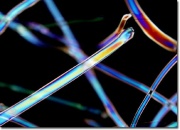Difference between revisions of "Cupro fiber"
m (Text replace - "== Authority ==" to "== Sources Checked for Data in Record ==") |
|||
| Line 7: | Line 7: | ||
cuprammonium rayon; cupro fibre (Br.); fibras cuproamoniacales, rayón (Esp.); cupro vezel (caprama) (Ned); Bemberg; cupra rayon; rayon; Cuprama; Cupresa; | cuprammonium rayon; cupro fibre (Br.); fibras cuproamoniacales, rayón (Esp.); cupro vezel (caprama) (Ned); Bemberg; cupra rayon; rayon; Cuprama; Cupresa; | ||
| + | == Risks == | ||
| − | == | + | Sunlight slowly causes degradation and loss of strength. |
| + | == Physical and Chemical Properties == | ||
Soluble in hot dilute and cold concentration acids. Insoluble in most organic solvents. Fiber is smooth with no striations. Cross section is circular. Tenacity = 1.7-2.3 g/denier (dry); 1.1-1.135 (wet); Elongation = 10-17 % (dry); 17-23% (wet); Moisture regain = 11-12.5%. | Soluble in hot dilute and cold concentration acids. Insoluble in most organic solvents. Fiber is smooth with no striations. Cross section is circular. Tenacity = 1.7-2.3 g/denier (dry); 1.1-1.135 (wet); Elongation = 10-17 % (dry); 17-23% (wet); Moisture regain = 11-12.5%. | ||
| Line 20: | Line 22: | ||
| 1.54 | | 1.54 | ||
|} | |} | ||
| − | |||
| − | |||
| − | |||
| − | |||
| − | |||
| − | |||
| − | |||
| − | |||
== Comparisons == | == Comparisons == | ||
| Line 33: | Line 27: | ||
[[media:download_file_96.pdf|Properties of Synthetic Fibers]] | [[media:download_file_96.pdf|Properties of Synthetic Fibers]] | ||
| − | + | == Resources and Citations == | |
| − | |||
| − | == | ||
* Hoechst Celanese Corporation, ''Dictionary of Fiber & Textile Technology'' (older version called Man-made Fiber and Textile Dictionary, 1965), Hoechst Celanese Corporation, Charlotte NC, 1990 | * Hoechst Celanese Corporation, ''Dictionary of Fiber & Textile Technology'' (older version called Man-made Fiber and Textile Dictionary, 1965), Hoechst Celanese Corporation, Charlotte NC, 1990 | ||
Revision as of 09:33, 15 October 2020
Description
Rayon produced from pure cellulose dissolved in an ammonium solution of copper oxide. The process for making cuprammonium fibers was discovered in 1890 by Louis Despeissis in France. Two years later, a company in Germany began using the process to produce filaments for lightbulbs. However, cupro rayon was soon replaced by Viscose rayon, and the process was not revived until 1919 by J.P. Bemberg. Cuprammonium rayon fibers are white, transparent and very silklike. It does not have striations or markings. Cupro is made into chiffons, satins, nets, and other sheer fabrics (Cook 1984).
Synonyms and Related Terms
cuprammonium rayon; cupro fibre (Br.); fibras cuproamoniacales, rayón (Esp.); cupro vezel (caprama) (Ned); Bemberg; cupra rayon; rayon; Cuprama; Cupresa;
Risks
Sunlight slowly causes degradation and loss of strength.
Physical and Chemical Properties
Soluble in hot dilute and cold concentration acids. Insoluble in most organic solvents. Fiber is smooth with no striations. Cross section is circular. Tenacity = 1.7-2.3 g/denier (dry); 1.1-1.135 (wet); Elongation = 10-17 % (dry); 17-23% (wet); Moisture regain = 11-12.5%.
| Melting Point | 250 (dec) |
|---|---|
| Density | 1.54 |
Comparisons
Properties of Synthetic Fibers
Resources and Citations
- Hoechst Celanese Corporation, Dictionary of Fiber & Textile Technology (older version called Man-made Fiber and Textile Dictionary, 1965), Hoechst Celanese Corporation, Charlotte NC, 1990
- S.R.Trotman, E.R. Trotman, Textile Analysis, J.B. Lippincott Company, Philadelphia, 1932
- Rosalie Rosso King, Textile Identification, Conservation, and Preservation, Noyes Publications, Park Ridge, NJ, 1985
- Marjory L. Joseph, Introductory Textile Science, Holt, Rinehart and Winston, Fort Worth, TX, 1986
- J.Gordon Cook, Handbook of Textile Fibres:I Natural Fibres, Merrow Publishing Co. , Durham, England, 1984
- Identification of Textile Materials, The Textile Institute, Manchester, England, 1985
- The American Heritage Dictionary or Encarta, via Microsoft Bookshelf 98, Microsoft Corp., 1998
